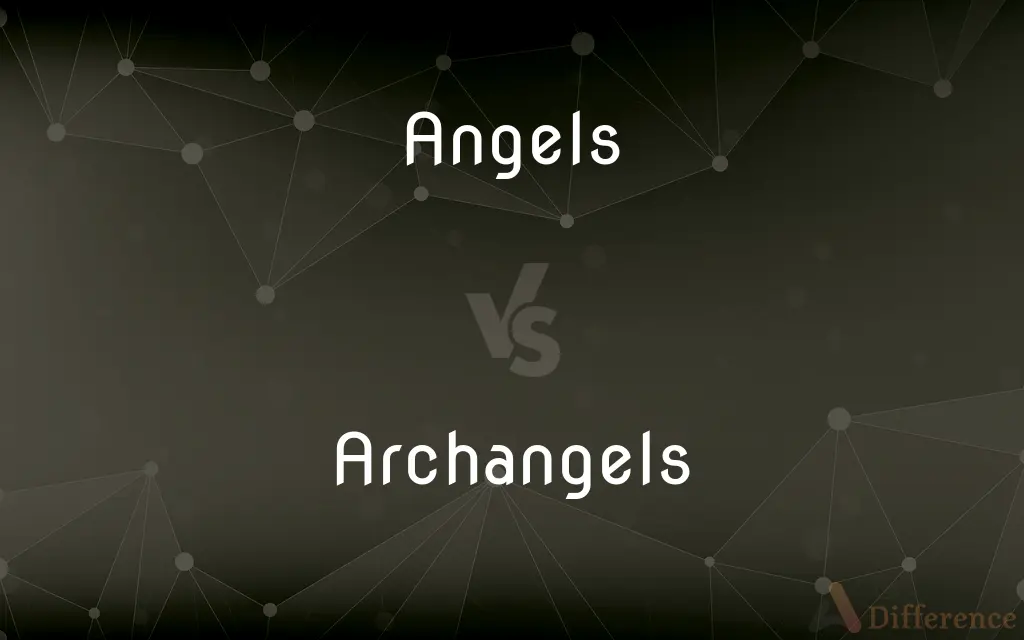Angels vs. Archangels — What's the Difference?
By Tayyaba Rehman — Published on December 24, 2023
Angels are celestial beings serving as messengers and guardians, while Archangels are higher-ranking angels with specific roles and greater responsibilities in religious texts.

Difference Between Angels and Archangels
Table of Contents
ADVERTISEMENT
Key Differences
Angels are generally perceived as heavenly beings created by a divine entity to carry out various tasks, such as delivering messages or guarding humans. Archangels, conversely, are considered chief or principal angels, often recognized for their leadership roles in the angelic hierarchy.
Throughout various religious and spiritual texts, Angels are frequently depicted as benevolent entities, often sent to guide, protect, or bring divine messages to humans. Archangels are presented with a more distinct identity and are known for specific missions or duties they oversee in the celestial realm.
Many believers feel a personal connection with Angels, believing that each person has a guardian angel watching over them. Archangels, while also protective, are often invoked for broader purposes, such as seeking guidance on significant life decisions or during challenging times.
The depiction of Angels often varies across different cultures and religions. Generally, they are seen as pure, luminous beings with wings. Archangels are similarly portrayed, but they might have unique attributes or symbols associated with them to denote their elevated status and specific roles.
While both Angels and Archangels serve the divine, Archangels are often given reverence for their elevated status and are sometimes associated with certain elements, tasks, or even specific days.
ADVERTISEMENT
Comparison Chart
Hierarchical Rank
Lower-ranking celestial beings
Higher-ranking angels
General Role
Messengers, guardians
Leaders with specific roles
Personal Connection
Often seen as personal guardians
Invoked for broader purposes
Depiction
Luminous beings with wings
Similar, but with distinct attributes/symbols
Association
Associated with general divine messages and protection
Associated with specific elements or tasks
Compare with Definitions
Angels
Intermediaries between the divine and humans.
She prayed, hoping the Angels would convey her wishes to the heavens.
Archangels
Chief angels with specific roles in the celestial hierarchy.
Michael and Gabriel are commonly known Archangels in Christian tradition.
Angels
Entities believed to guide and guard individuals.
As a child, he was told that Angels protected him as he slept.
Archangels
Angels with distinct identities and duties.
Each of the Archangels is associated with a unique mission or task.
Angels
Celestial beings believed to act as messengers or protectors.
Many believe that Angels watch over them during their lifetime.
Archangels
High-ranking angels often invoked for major guidance.
During the ceremony, they called upon the Archangels for blessings.
Angels
Heavenly entities often depicted with wings.
In the painting, Angels hovered above the serene landscape.
Archangels
Celestial leaders often associated with elements or tasks.
Raphael, one of the Archangels, is frequently linked to healing.
Angels
A typically benevolent celestial being that acts as an intermediary between heaven and earth, especially in Christianity, Judaism, Islam, and Zoroastrianism.
Archangels
Principal angels revered in various religious texts.
In some scriptures, Archangels are mentioned as messengers of significant divine revelations.
Angels
A representation of such a being, especially in Christianity, conventionally in the image of a human figure with a halo and wings.
Archangels
A high-ranking angel.
Angels
Angels(Christianity) The last of the nine orders of angels in medieval angelology. From the highest to the lowest in rank, the orders are
Seraphim, cherubim, thrones, dominations or dominions, virtues, powers, principalities, archangels, and angels.
Archangels
Archangels The eighth of the nine orders of angels in medieval angelology.
Angels
A guardian spirit or guiding influence.
Archangels
Plural of archangel
Angels
A kind and lovable person.
Angels
One who manifests goodness, purity, and selflessness.
Angels
A financial backer of an enterprise, especially a dramatic production or a political campaign.
Angels
Plural of angel
Angels
Infl of angel
Angels
Spiritual beings present in various religions and mythologies.
In many cultures, Angels are revered as pure and benevolent entities.
Common Curiosities
Do Archangels have distinct identities?
Yes, Archangels have distinct identities and are often recognized for specific missions or duties they oversee.
How do Archangels differ from Angels?
Archangels are higher-ranking angels with specific roles and greater responsibilities in the celestial hierarchy.
How are Angels typically depicted?
Angels are generally depicted as luminous beings, often with wings, symbolizing purity and divinity.
What are Angels?
Angels are celestial beings often seen as messengers or guardians in various religious beliefs.
Are Angels considered protectors?
Yes, many believe that Angels act as guardians, watching over and protecting individuals.
Do Archangels oversee other Angels?
Yes, given their higher rank, Archangels are often seen as leaders or overseers of other Angels.
Can both Angels and Archangels intervene in human affairs?
Many believers feel that both Angels and Archangels can intervene, offering guidance, protection, or delivering divine messages.
Are all Angels considered guardians?
While many believe in guardian Angels assigned to protect individuals, not all Angels are necessarily seen as personal guardians.
Are Archangels found in all religious texts?
Not all, but Archangels are present in several religious texts, including Christianity, Judaism, and Islam.
Can humans communicate with Angels?
Many believe that through prayer or meditation, they can communicate with or seek guidance from Angels.
Are there any famous Archangels?
Yes, Michael, Gabriel, and Raphael are among the most recognized Archangels in various religious traditions.
Are Angels and Archangels always benevolent?
In most traditions, Angels and Archangels are depicted as benevolent, although some texts also speak of fallen angels.
Do people worship Archangels?
While Archangels are highly revered, worship is typically directed at the divine. However, many do invoke Archangels for guidance or blessings.
How many Archangels are there?
The number of Archangels varies across different religious texts and traditions.
Share Your Discovery

Previous Comparison
Vitamin B6 vs. Vitamin B12
Next Comparison
Constitutional Isomers vs. StereoisomersAuthor Spotlight
Written by
Tayyaba RehmanTayyaba Rehman is a distinguished writer, currently serving as a primary contributor to askdifference.com. As a researcher in semantics and etymology, Tayyaba's passion for the complexity of languages and their distinctions has found a perfect home on the platform. Tayyaba delves into the intricacies of language, distinguishing between commonly confused words and phrases, thereby providing clarity for readers worldwide.











































